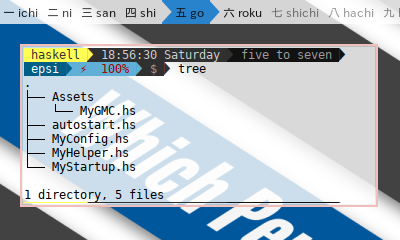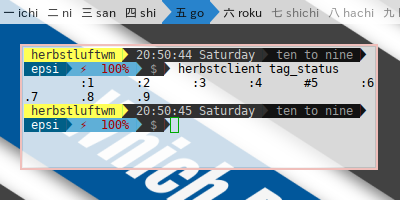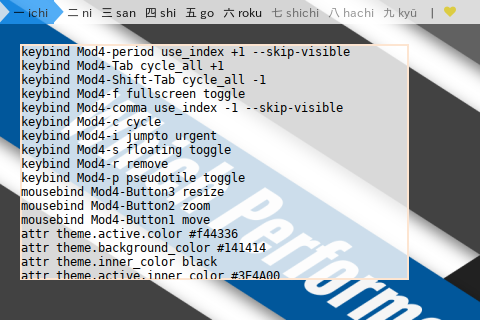Preface
Goal: Separate Main Flow, Code, and Data.
So anyone can focus to alter special customization in Main Script, without changing the whole stuff.
Reading
Before you jump off to scripting, you might desire to read this overview.
And also this MapM_ tutorial.
It seems to be I’m not the only person who used Haskell with HerbsluftWM.
- https://hackage.haskell.org/package/hlwm#readme
All The Source Code:
Impatient coder like me, like to open many tab on browser.
Table of Content
-
Preface: Table of Content
-
3: System Calls
-
6: Hash: Config
-
10: Run Baby Run
1: Directory Structure
Directory Structure has been explained in preface.
This figure will explain how it looks
in Haskell script directory.

2: Modularizing in Haskell
Module in Haskell follow rules in identifier naming. And the module filename should also follow these rules.
Declare a module
Haskell module have to explicitly define what to export. Anything exported become public in caller script. And the rest is private to module.
module MyHelper
( hc
, do_config
, set_tags_with_name
, do_panel
) whereCall a module
import MyHelper3: System Calls
Here we wrap herbstclient system call
in a function named hc.
helper.hs
hc :: String -> IO ExitCode
hc arguments = system $ "herbstclient " ++ argumentsautostart.hs
main = do
-- Read the manual in $ man herbstluftwm
hc "emit_hook reload"
-- gap counter
system $ "echo 35 > /tmp/herbstluftwm-gap"4: Array: Tag Names and Keys
Is it just me? Or didn’t I do googling hard enough ? I cannot find a way to define array by range in just one line.
config.hs
tag_names = [1..9]
tag_keys = [1..9] ++ [0]
5: Hash: Color Schemes
Using key-value pairs, a simple data structure.
gmc.hs
colorSchemes :: [(String, String)]
colorSchemes =
[("white", "#ffffff")
,("black", "#000000")
,("grey50", "#fafafa")
,("grey100", "#f5f5f5")
]
myColor :: String -> String
myColor key = M.findWithDefault "#ffffff" key (fromList colorSchemes)autostart.hs
main = do
-- background before wallpaper
system $ "xsetroot -solid '" ++ myColor "blue500" ++ "'"View Source File:
6: Hash: Config
The Hash in Config is very similar with the colors above. Except that it has string concatenation all over the place.
config.hs
-- Modifier variables
s = "Shift"
c = "Control"
m = "Mod4"
a = "Mod1"
keybinds :: [Pair]
keybinds =
-- session
[(m ++ "-" ++ s ++ "-q", "quit")
,(m ++ "-" ++ s ++ "-r", "reload")
,(m ++ "-" ++ s ++ "-c", "close")
]This config will be utilized in main script as shown in the following code.
autostart.hs
main = do
do_config "keybind" keybinds
do_config "keybind" tagskeybinds
do_config "mousebind" mousebinds
do_config "attr" attributes
do_config "set" sets
do_config "rule" rulesView Source File:
7: Processing The Hash Config
This is the heart of this script.
This do-config function has two arguments,
the herbstclient command i.e “keybind”, and hash from config.
helper.hs
do_config :: String -> [Pair] -> IO ()
do_config command pairs = do
-- loop over a hash dictionary of tuples
mapM_ (\(key, value) -> do
hc(command ++ " " ++ key ++ " " ++ value)
-- uncomment to debug in terminal
-- putStrLn(command ++ " " ++ key ++ " " ++ value)
) pairs Reading
Anyone new in Haskell, should not get intimidated by Haskell operator. It is just foreach written in Haskell.
I also wrote a tutorial specifically for the function above. I hope this helps.
Debug Herbstclient Command
I do not remove line where I do debug when I made this script, so anyone can use it later, avoid examining blindly. Sometimes strange things happen. Just uncomment the line to see what happened.
putStrLn(command ++ " " ++ key ++ " " ++ value)You can see the debugging result in figure below.
View Source File:
8: Setting the Tags
For clarity, I break down the process into some function.
get_indices :: [Int] -> [Int]
get_indices l = [0 .. (length l) - 1]
-- Pattern Matching
keybind_keytag :: Int -> Maybe Int -> IO ()
keybind_keytag index Nothing = do return ()
keybind_keytag index (Just key) = do
hc("keybind Mod4-" ++ show(key)
++ " use_index '" ++ show(index) ++ "'")
hc("keybind Mod4-Shift-" ++ show(key)
++ " move_index '" ++ show(index) ++ "'")
return ()
set_tag :: Int -> IO ()
set_tag index = do
hc("add '" ++ show(tag_names !! index) ++ "'")
let key = tag_keys !! index
keybind_keytag index (Just key)
return ()
set_tags_with_name :: IO ()
set_tags_with_name = do
hc("rename default '"
++ show (tag_names !! 0) ++ "' 2>/dev/null || true")
mapM_ set_tag (get_indices tag_names)
return ()Using lambda syntatic sugar and pattern matching.
helper.hs
set_tags_with_name :: IO ()
set_tags_with_name = do
hc("rename default '"
++ show (tag_names !! 0) ++ "' 2>/dev/null || true")
mapM_ (\index -> do
hc("add '" ++ show(tag_names !! index) ++ "'")
-- uncomment to debug in terminal
-- putStrLn $ show index
let key = tag_keys !! index
case (Just key) of
Nothing -> do return()
Just akey -> do
hc("keybind Mod4-" ++ show(akey)
++ " use_index '" ++ show(index) ++ "'")
hc("keybind Mod4-Shift-" ++ show(akey)
++ " move_index '" ++ show(index) ++ "'")
return ()
) ([0 .. (length tag_names) - 1]) -- indices9: Launch the Panel
The panel code is short, but the detail is long. We have to extract value from IO action
-
panelFilename: IO String. -
listMonitors: IO [String].
do_panel :: IO ()
do_panel = do
panel <- panelFilename
monitors <- listMonitors
mapM_ (\monitor -> do
system(panel ++ " " ++ show(monitor) ++ " &")
) monitors
return ()panelFilename IO action:
customFilename :: String -> String
customFilename home = home ++ path where path = "/.config/herbstluftwm/haskell/panel-lemonbar"
where path = "/.config/herbstluftwm/bash/dzen2/panel.sh"
panelFilename :: IO String
panelFilename = do
home <- getHomeDirectory
let file = customFilename home
isExist <- doesFileExist file
permission <- getPermissions file
let exec_ok = executable permission
-- need to check for executable permission also
let panel = if(isExist && exec_ok)
then file
else "/etc/xdg/herbstluftwm/panel.sh"
-- uncomment to debug in terminal
-- putStrLn panel
return panellistMonitors IO action:
listMonitors :: IO [String]
listMonitors = do
(_, Just pipeout, _, _) <-
createProcess (proc "herbstclient" ["list_monitors"])
{ std_out = CreatePipe }
(_, Just cutout, _, ph) <-
createProcess (proc "cut" ["-d:", "-f1"])
{ std_in = UseHandle pipeout, std_out = CreatePipe }
raw <- hGetContents cutout
_ <- waitForProcess ph
-- uncomment to debug in terminal
-- putStrLn raw
let monitors = lines raw -- or splitOn instead
return monitorsYes it is very long compared with BASH/Perl/Python counterpart.
10: Run Baby Run
This is the last part. It is intended to be modified. Everyone has their own personal preferences.
startup.hs
startup_run :: IO ()
startup_run = do
-- no need to use silent, as the std_err redirected
let args = ["new_attr", "bool", "my_not_first_autostart"]
(_, _, Just pipeerr, ph) <-
createProcess (proc "herbstclient" args)
{ std_err = CreatePipe }
capture_err <- hGetContents pipeerr
exitcode <- waitForProcess ph
-- The test may use against, either exitcode or capture_err
when (exitcode == ExitSuccess) $ do
-- non windowed app
system $ "compton &"
system $ "dunst &"
system $ "parcellite &"
system $ "nitrogen --restore &"
system $ "mpd &"
-- windowed app
system $ "xfce4-terminal &"
system $ "sleep 1 && firefox &"
system $ "sleep 2 && geany &"
system $ "sleep 2 && thunar &"
return ()Specific Haskell Advantge
Since the standard eror is redirected, We can use either exitcodo or standard error, to determine whether the application should be launch or not.
View Source File:
11: Putting It All Together
The last part is going to main script and putting it all back together.
Now the flow is clear
Header Part: autostart.hs
import System.Process
import MyGMC
import MyConfig
import MyHelper
import MyStartupProcedural Part: autostart.hs
main = do
-- background before wallpaper
system $ "xsetroot -solid '" ++ myColor "blue500" ++ "'"
-- Read the manual in $ man herbstluftwm
hc "emit_hook reload"
-- gap counter
system $ "echo 35 > /tmp/herbstluftwm-gap"
-- do not repaint until unlock
hc "lock"
-- standard
hc "keyunbind --all"
hc "mouseunbind --all"
hc "unrule -F"
set_tags_with_name
-- do hash config
do_config "keybind" keybinds
do_config "keybind" tagskeybinds
do_config "mousebind" mousebinds
do_config "attr" attributes
do_config "set" sets
do_config "rule" rules
-- unlock, just to be sure
hc "unlock"
-- launch statusbar panel (e.g. dzen2 or lemonbar)
do_panel
-- load on startup
startup_runView Source File:
Coming up Next
After the Window Manager, comes the Panel.
Happy Configuring.
